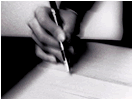

Nothing is more
important to the success of your
case on appeal than the content
and quality of your appellate
brief. Lawyers whose appellate
briefs fail to explain clearly
and convincingly why their client
deserves to win on appeal, and
why the trial court's rulings
were wrong or right, significantly
decrease the client's chances
of winning and complicate the
appellate court's efforts to reach
the right result.
Bashman’s
appellate briefs are concise and
well-written, present legal arguments
in an easy to understand and persuasive
manner, and set forth the facts
and procedural history in a non-argumentative
style that nonetheless advances
the client’s interests.
The assertion that any lawyer
can write an effective appellate
brief is simply not true. Just
as a client deserves the best
trial lawyer for its jury trial
and the best transactional lawyer
to negotiate and document a corporate
deal, a client deserves an experienced,
talented, and highly regarded
appellate advocate when its case
goes on appeal.
Bashman has participated
in “beauty contests”
in which prospective clients that
seek and can afford to hire the
best appellate advocates have
reviewed the briefs he has written
in other appeals and have decided
to hire him. Other clients, after
their in-house attorneys have
reviewed Bashman’s appellate
briefs, have decided to send him
appellate work in cases that other
law firms had previously handled.
Bashman has filed hundreds of
appellate briefs, ranging from
briefs filed on the merits in
the U.S. Supreme Court to briefs
filed in a wide variety of federal
and state appellate courts.
In each and every
matter, Bashman seeks to produce
the best possible appellate briefs
in a cost-effective manner. Moreover,
the briefs will be prepared in
a timely fashion, allowing sufficient
opportunity for review and comment
in advance of the filing deadline.
Most of the appellate briefs that
Bashman has written have been
filed in cases where he had no
previous involvement, providing
him with the same perspective
on a case that the appellate judges
will have.
Before becoming
an appellate lawyer in private
practice, Bashman worked for two
years as a law clerk to a judge
on the U.S. Court of Appeals for
the Third Circuit. The experience
revealed that high quality appellate
advocacy wins cases and that the
pedestrian (or worse) quality
of appellate advocacy practiced
by most lawyers can lose cases.
It also demonstrated that the
vast majority of appellate briefs
do a poor job of communicating
the facts, procedural history,
and legal arguments in a manner
helpful either to the appellate
court or the party submitting
the brief.
Appellate judges
are incredibly overworked. Preparing
for just a single week of oral
argument requires them to read
the briefs in approximately forty
cases. Over a year, the typical
appellate judge reads more than
100,000 pages of briefs. If an
appellate brief is not well-written
or well-reasoned, if it is not
persuasive and easy to understand,
or if it contains convoluted sentences,
dense prose, or distracting typographical
errors, appellate judges may gloss
over the text of the brief instead
of exerting the effort needed
to comprehend and be persuaded
by it.
Appellate briefs
written in a lively, understated,
and persuasive fashion are likely
to convince appellate judges;
briefs employing heated rhetoric
and overstatement, or written
in an overconfident tone, using
emphatic, unequivocal, and conclusory
terms, are likely to fail to persuade.
An experienced appellate
advocate is also keenly aware
that appellate judges create and
are constrained by precedent.
The abilities to demonstrate how
a case either is or is not governed
by precedent and to argue for
a particular rule of law in an
area bereft of precedent rank
high among Bashman’s skills.
Clients of all sizes
and sophistication are now more
aware than ever that appellate
practitioners add significant
value. By clicking
here, you can access examples
of appellate briefs that Bashman
has recently filed in various
appellate courts.